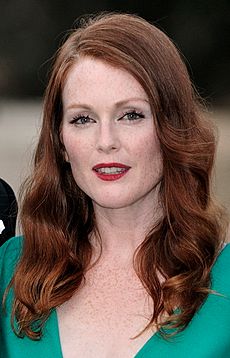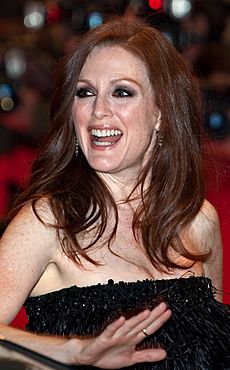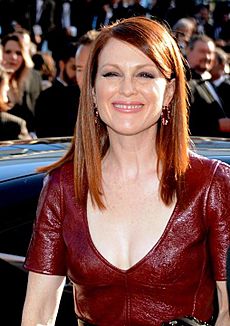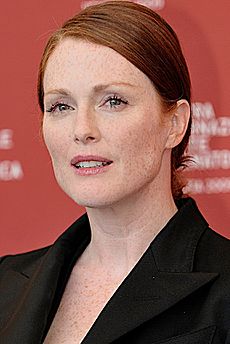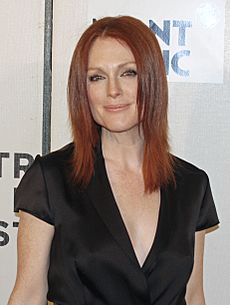Julianne Moore facts for kids
Quick facts for kids
Julianne Moore
|
|
|---|---|
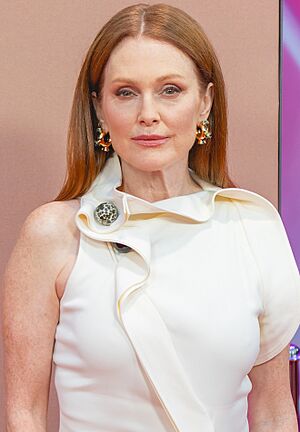
Moore in 2024
|
|
| Born |
Julie Anne Smith
December 3, 1960 Fort Bragg, North Carolina, U.S.
|
| Citizenship |
|
| Education | Boston University (BFA) |
| Occupation |
|
| Years active | 1984–present |
|
Works
|
Full list |
| Spouse(s) |
|
| Children | 2 |
| Relatives | Peter Moore Smith (brother) |
| Awards | Full list |
Julie Anne Smith (born December 3, 1960), known to the world as Julianne Moore, is a famous American actress and author of children's books. Since the early 1990s, she has starred in many movies. She is known for playing women with complex emotions in independent films and for her roles in big-budget blockbusters.
Moore has won many major awards for her acting. These include an Academy Award, a BAFTA Award, two Emmy Awards, and two Golden Globe Awards. She has also won Best Actress awards at the world's top three film festivals: Cannes, Berlin, and Venice. In 2015, Time magazine named her one of the 100 most influential people in the world. In 2020, The New York Times called her one of the greatest actors of the 21st century.
After studying acting at Boston University, Moore started her career on the TV soap opera As the World Turns. Her role earned her a Daytime Emmy Award. She became well-known after appearing in the movie Short Cuts (1993). She later starred in hit movies like Nine Months (1995) and The Lost World: Jurassic Park (1997).
She received Oscar nominations for her roles in Boogie Nights (1997), The End of the Affair (1999), Far from Heaven (2002), and The Hours (2002). She won the Academy Award for Best Actress for playing a woman with Alzheimer's disease in Still Alice (2014). She also played President Alma Coin in the final two Hunger Games movies.
Besides acting, Moore has written a popular series of children's books about a character named Freckleface Strawberry. She is married to director Bart Freundlich, and they have two children.
Contents
Early Life and Schooling
Julianne Moore was born Julie Anne Smith on December 3, 1960, in North Carolina. Her father, Peter Moore Smith, was a colonel and military judge in the U.S. Army. Her mother, Anne, was a psychologist from Scotland. Because her mother was Scottish, Moore became a British citizen in 2011.

Due to her father's army job, Moore's family moved often. She lived in many places, including Alabama, Texas, Panama, and Germany. She attended nine different schools. Moving so much was hard, but Moore later said it helped her acting career. It taught her how to observe people and adapt to new situations.
When she was 16, her family moved to Frankfurt, Germany. At her high school there, she started acting in plays. Her English teacher encouraged her to pursue it as a career. Her parents supported her but wanted her to get a college degree. She graduated from Boston University in 1983 with a degree in Theatre.
Acting Career
Getting Started
"There was already a Julie Smith, a Julie Anne Smith, there was everything. My father's middle name is Moore; my mother's name is Anne. So I just slammed the Anne onto the Julie. That way, I could use both of their names and not hurt anyone's feelings."
After college, Moore moved to New York City. She started acting in plays and on TV. Her first big role was on the soap opera As the World Turns from 1985 to 1988. She played two characters, half-sisters Frannie and Sabrina Hughes. This role won her a Daytime Emmy Award.
In 1990, she appeared in her first movie, Tales from the Darkside: The Movie. She gained more attention in the 1992 thriller The Hand That Rocks the Cradle. In 1993, she appeared with Harrison Ford in the hit movie The Fugitive.
Her breakthrough role came in Robert Altman's film Short Cuts (1993). The movie was a success, and the cast won awards at the Venice Film Festival and the Golden Globe Awards. This role made many people notice her talent.
Becoming a Star
In 1995, Moore starred in the film Safe, where she played a woman who develops a strange illness. Her performance was highly praised. That same year, she starred with Hugh Grant in the hit comedy Nine Months. This movie helped make her a leading actress in Hollywood.
A major moment in her career was when Steven Spielberg cast her in The Lost World: Jurassic Park (1997). The movie was the sequel to Jurassic Park. It was a huge box office success and made Moore a globally recognized star.
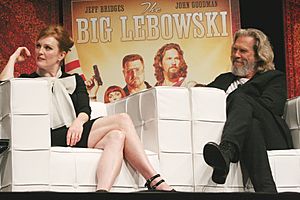
In 1997, she starred in Boogie Nights, a film about the movie industry in the 1970s. Her role as Amber Waves earned her her first Academy Award nomination. The next year, she appeared in The Big Lebowski, which has become a fan favorite over the years.
At the end of the 1990s, Moore starred in several successful films. She earned her second Oscar nomination for The End of the Affair. She also appeared in the popular drama Magnolia (1999).
Major Success and Awards
In 2001, Moore played FBI agent Clarice Starling in Hannibal, the sequel to The Silence of the Lambs. The film was a box office hit.
The year 2002 was a huge one for Moore's career. She was nominated for two Academy Awards in the same year. She received a Best Actress nomination for Far from Heaven, where she played a 1950s housewife. Her performance won awards from many critics' groups.
Her second Oscar nomination that year was for The Hours, where she starred with Nicole Kidman and Meryl Streep. She again played a troubled housewife from the 1950s. For this film, she and her co-stars won the Best Actress award at the Berlin International Film Festival.
Throughout the 2000s, Moore starred in a variety of films. These included the thriller The Forgotten and the acclaimed drama Children of Men (2006). In 2009, she starred in A Single Man, which earned her another Golden Globe nomination.
Recent Work and 'Still Alice'
In 2010, Moore starred in the comedy-drama The Kids Are All Right. The film is about a couple whose children find their biological father. The movie was very popular with critics and earned Moore nominations for a Golden Globe and a BAFTA Award.
In 2012, she played politician Sarah Palin in the HBO movie Game Change. Her performance was highly praised, and she won a Golden Globe, an Emmy Award, and a Screen Actors Guild (SAG) Award.
In 2014, Moore had one of her most successful years. She won the Best Actress award at the Cannes Film Festival for the film Maps to the Stars. She also played President Alma Coin in The Hunger Games: Mockingjay – Part 1, her highest-grossing film.
Her most celebrated role came in Still Alice (2014). She played a professor who is diagnosed with early-onset Alzheimer's disease. To prepare, she spent months learning about the illness. Her performance was called brilliant by critics. She won the Academy Award, Golden Globe, BAFTA, and SAG Award for Best Actress.
Since then, Moore has starred in many other films. She played the villain in Kingsman: The Golden Circle (2017) and starred in dramas like Gloria Bell (2018) and May December (2023). In 2024, she starred in the historical series Mary & George.
Writing for Children
Besides acting, Julianne Moore is a successful children's author. Her first book, Freckleface Strawberry, was published in 2007. It became a New York Times Best Seller. The book tells the story of a girl who learns to love her freckles. Moore was inspired by her own childhood, when kids teased her for her freckles.
She has written several more books in the Freckleface Strawberry series. The books teach children that they can solve their own problems and be proud of who they are. The series was also turned into a musical, which opened in New York in 2010.
In 2013, she wrote another book called My Mom is a Foreigner, But Not to Me. It was based on her experience growing up with a mother from Scotland.
Personal Life
Moore was married to actor John Gould Rubin from 1986 to 1995. In 1996, she began a relationship with director Bart Freundlich. They married in 2003 and have two children, a son and a daughter. They live in New York City. Moore has said that her family is the most satisfying part of her life.
Moore is politically active. She supports causes like women's health organizations, gay rights, and gun safety. She is also an Artist Ambassador for the charity Save the Children.
Moore is known for living a normal life away from the spotlight. She has said she does not see much value in being a celebrity. She is also known for her natural appearance and has spoken about not wanting plastic surgery.
Famous Films and Awards
According to the review website Rotten Tomatoes, some of Moore's most praised films include:
- Short Cuts (1993)
- Safe (1995)
- Boogie Nights (1997)
- The Big Lebowski (1998)
- Magnolia (1999)
- The Hours (2002)
- Far from Heaven (2002)
- Children of Men (2006)
- A Single Man (2009)
- The Kids Are All Right (2010)
- Still Alice (2014)
- May December (2023)
Her highest-grossing films at the box office include:
- The Fugitive (1993)
- Nine Months (1995)
- The Lost World: Jurassic Park (1997)
- Hannibal (2001)
- The Forgotten (2004)
- Crazy, Stupid, Love (2011)
- Non-Stop (2014)
- The Hunger Games: Mockingjay – Part 1 (2014)
- The Hunger Games: Mockingjay – Part 2 (2015)
- Kingsman: The Golden Circle (2017)
Moore has won many of the film industry's most important awards. She is one of only a few actors to win the top acting prize at the Cannes, Berlin, and Venice film festivals.
See also
 In Spanish: Julianne Moore para niños
In Spanish: Julianne Moore para niños
 | Leon Lynch |
 | Milton P. Webster |
 | Ferdinand Smith |


